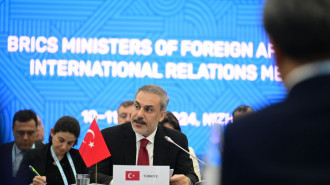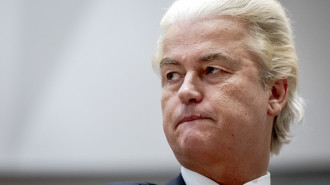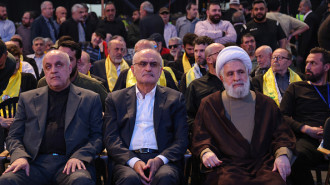Saudi King Salman: 'We have right to defend ourselves'
Saudi King Salman: 'We have right to defend ourselves'
The Saudi king has warned other countries not to 'meddle' in Riyadh's domestic affairs, in comments likely directed at Iran.
3 min read
Sunni Saudi Arabia has long been fierce rivals with Shia Iran [Getty]
Saudi Arabia's King Salman said on Sunday his country had "the right to defend itself", days after announcing the possibility of sending ground troops into Syria.
The king called on other countries not to interfere in the kingdom's internal affairs, in what appeared to be a rebuke to Riyadh's main regional foe, Iran, which it accuses of attempting to stir unrest.
The fierce rivalry between Tehran and Riyadh was further inflamed in January, when Saudi Arabia executed Shia cleric Sheikh Nimr al-Nimr, leading to a condemnation by Iran that prompted the attack and torching of the Saudi embassy in Tehran.
"It is our right to defend ourselves without interfering in the affairs of others. We call on others not to interfere in our affairs," said King Salman in a speech at the annual al-Janadriyah cultural festival.
"We defend the Muslim lands, cooperate with the Arab and Muslim brothers everywhere to defend their countries and ensure their independence," the king said.
"We want security and peace prevail in our region," he added.
Last week, a Saudi military spokesman said the kingdom was ready to send ground troops to fight the Islamic State group [IS] in Syria - where Iran has been a long-standing and key ally of President Bashar al-Assad's government throughout the five-year uprising.
The United Arab Emirates also announced it was ready to supply ground troops to help support and train an international military coalition against IS in Syria, provided such efforts were led by the US.
In response, Syrian and Iranian officials have warned Saudi Arabia to drop any plans to send troops to bolster retreating Syrian rebels facing a potentially shattering defeat in the northern province of Aleppo.
Syrian Foreign Minister Walid al-Moallem, had warned that Saudi troops entering Syria would "return home in wooden coffins".
The chief of Iran's elite Revolutionary Guards, meanwhile, said Saudi Arabia would not dare send ground troops into war-torn Syria because it would amount to "suicide".
One of Iraq's most powerful Iranian-backed Shia militias on Sunday also warned that Saudi and Emirati forces sent to Syria or Iraq would "open the gates of hell".
The Kataib Hizballah militia said: "The sons of Saud and those rulers who stand behind them should not take a risk and learn [their] lesson."
Saudi Arabia is already deeply involved in Yemen's civil war, where it is fighting Houthi rebels widely thought to be backed by Iran.
Saudi Arabia and other Gulf countries have long viewed Iran as a regional menace, and Riyadh and Tehran have backed opposite sides in the wars in Syria and Yemen.
Iran denies seeking to destabilise the region or incite sectarian hatred. It, in turn, accuses Riyadh of fomenting discord by backing rebels in Syria, going to war in Yemen and propagating an ultra-conservative Sunni Muslim school that declares Shias heretical.
The king called on other countries not to interfere in the kingdom's internal affairs, in what appeared to be a rebuke to Riyadh's main regional foe, Iran, which it accuses of attempting to stir unrest.
The fierce rivalry between Tehran and Riyadh was further inflamed in January, when Saudi Arabia executed Shia cleric Sheikh Nimr al-Nimr, leading to a condemnation by Iran that prompted the attack and torching of the Saudi embassy in Tehran.
"It is our right to defend ourselves without interfering in the affairs of others. We call on others not to interfere in our affairs," said King Salman in a speech at the annual al-Janadriyah cultural festival.
"We defend the Muslim lands, cooperate with the Arab and Muslim brothers everywhere to defend their countries and ensure their independence," the king said.
"We want security and peace prevail in our region," he added.
Last week, a Saudi military spokesman said the kingdom was ready to send ground troops to fight the Islamic State group [IS] in Syria - where Iran has been a long-standing and key ally of President Bashar al-Assad's government throughout the five-year uprising.
The United Arab Emirates also announced it was ready to supply ground troops to help support and train an international military coalition against IS in Syria, provided such efforts were led by the US.
In response, Syrian and Iranian officials have warned Saudi Arabia to drop any plans to send troops to bolster retreating Syrian rebels facing a potentially shattering defeat in the northern province of Aleppo.
Syrian Foreign Minister Walid al-Moallem, had warned that Saudi troops entering Syria would "return home in wooden coffins".
The chief of Iran's elite Revolutionary Guards, meanwhile, said Saudi Arabia would not dare send ground troops into war-torn Syria because it would amount to "suicide".
One of Iraq's most powerful Iranian-backed Shia militias on Sunday also warned that Saudi and Emirati forces sent to Syria or Iraq would "open the gates of hell".
The Kataib Hizballah militia said: "The sons of Saud and those rulers who stand behind them should not take a risk and learn [their] lesson."
Saudi Arabia is already deeply involved in Yemen's civil war, where it is fighting Houthi rebels widely thought to be backed by Iran.
Saudi Arabia and other Gulf countries have long viewed Iran as a regional menace, and Riyadh and Tehran have backed opposite sides in the wars in Syria and Yemen.
Iran denies seeking to destabilise the region or incite sectarian hatred. It, in turn, accuses Riyadh of fomenting discord by backing rebels in Syria, going to war in Yemen and propagating an ultra-conservative Sunni Muslim school that declares Shias heretical.







 Follow the Middle East's top stories in English at The New Arab on Google News
Follow the Middle East's top stories in English at The New Arab on Google News


